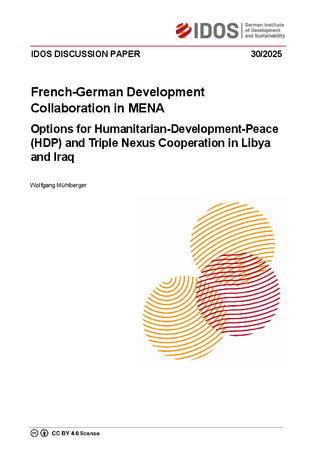French-German development collaboration in MENA: options for humanitarian-development-peace (HDP) and triple nexus cooperation in Libya and Iraq
Mühlberger, WolfgangDiscussion Paper (30/2025)
Bonn: German Institute of Development and Sustainability (IDOS)
ISBN: 978-3-96021-275-1
DOI: https://doi.org/10.23661/idp30.2025
This study takes a critical look at Franco-German relations in the field of international cooperation along the entire humanitarian-development-peace (HDP) spectrum to better gauge the usefulness of bilateral collaborative action in the Middle East and North Africa (MENA). Both the corresponding potential – for example in the current Syrian transition – as well as existing coordination formats are of interest to the inquiry. The latter are examined in more detail against the background of German and French activities in Libya and Iraq. In this context, the analysis also considers the HDP nexus as an instrument of cooperation, which offers ideal conditions for application in fragile, conflict-prone (Libya) or war-torn countries (Iraq) due to their complex needs. The paper concludes with a series of recommendations for initiating or strengthening Franco-German cooperation in fragile states of the MENA region in the fields of humanitarian aid, development policy, and peacebuilding measures.
The study is divided into three thematic sections, the first of which examines bilateral relations between Paris and Berlin, with a focus on the phase following the signing of the Aachen Agreement in 2019. The analysis of national and international framework conditions for and against international cooperation is also part of this section, taking into account the effects of the Trump 2.0 administration. In the second part, the foreign and development policy approaches of both countries are analysed with a focus on their Middle East policies. Here, convergences and divergent approaches are of special interest, allowing conclusions to be drawn about the ability and willingness to cooperate. The third section is devoted to a synthesis of the operationalisation of activities within the HDP spectrum, with Libya and Iraq as country examples, as well as additional considerations relating to Syria.
On the one hand, this approach enables one to identify structural factors that either hinder or promote bilateral Franco-German cooperation in the international context. On the other hand, sufficient space is also given to current developments in order to be able to categorise trends and contextual factors which have a reinforcing or weakening effect on cooperation drivers. The Discussion Paper concludes with a recapitulation of the findings, and derives actionable recommendations for strengthening cooperation between Paris and Berlin in the crisis-ridden MENA region on the basis of HDP coordination.
Wolfgang Mühlberger is a Middle East expert with over 20 years of professional experience in and on the region.

